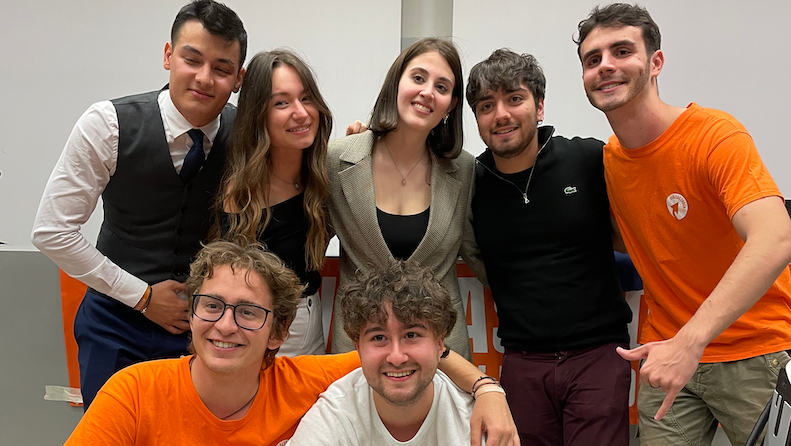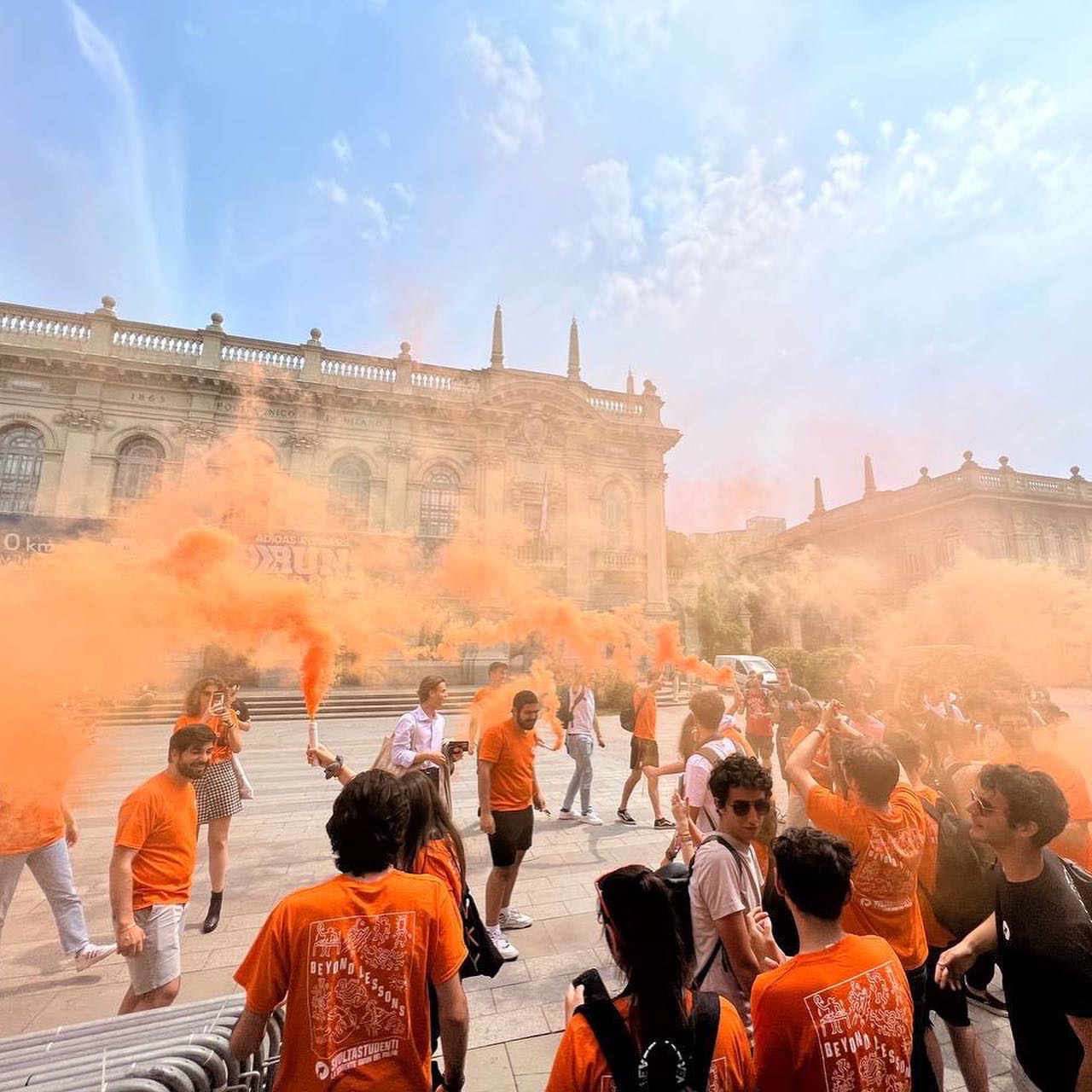Lately in our university "the topic" is the decision of the Academic Senate to have, starting from the A.A. 2014/2015, all master's degrees in English.
The clamor of the decision, to most, may seem perhaps excessive, but in what will be the active parts of this change the decision was like a tsunami, started quietly and exploded, with all its disruptive power, in a real and substantial all-round academic debate, where the 3 faces of our PoliMi found themselves face to face finding transversal support for each of the considerations under consideration.
Starting from the individual student, who does not feel fully at ease, to the screaming professor that English uses it "day by day" in what is his scientific research, we students have tried to make a little order and, from the several hundred observations we have received to our survey (both on our site and on social networks) the "sentiment" is largely in favor of the choice, the proportion is almost 75 to 25 .
Now we ask ourselves: are we the ones who, without experience, do not notice the problem? We who, looking to the future, look for all the opportunities for innovation, as we are already projected into a world where work connections will lead us to share our business strategies at an international level, as a future ruling class or perhaps we are missing some piece to be able to complete the puzzle?
We then confronted the one who is in a certain sense the father of this proposal, Professor Balducci (Delegate of the Rector for the theme of internationalization).
Good morning professor, first of all what do you teach and what were your studies?
Good morning guys.
I am PhD in Territorial Planning and Vice-Rector of politecnico di Milano.
I am full professor of Urban Planning and Policies and until a few months ago coordinator of the PhD in Spatial Planning and Urban Development.
I was Director of the Department of Architecture and Planning of the Politecnico di Milano (2001-2008), President of AESOP, the Association of European Planning Schools (2001-2004), founding member of the European Urban Research Association (EURA) and I am currently National Secretary of SIU, the Italian Society of Urban Planners. (http://www.sandrobalducci.com/)
What are your projects in the field of internationalization?
We can divide the theme of internationalization into two different aspects:
- OUT: I coordinate a team of delegates, each of them focused on a specific geographical area, which deals, on a three-year basis, with developing intercultural projects, which vary according to the peculiarities of each individual area of interest, such as the areas of the BRIC (Brazil, Russia, India and China) with respect to which our University is particularly sensitive.
- IN: a project to support internationalization has been promoted, which provides for the call of 20% of non-Italian teachers, also referring to the indications of the Gelmini reform which, associated with the International Research Fellowships, provides for the promotion of research grants for young researchers from all over the world, and the possibility of calling professors in sabbatical years, who therefore have the opportunity to teach at the Polytechnic.
You were the promoter of the sustainable campus, do you believe that the concept of campus can be the forerunner of a new conception of university?
Yes.
The idea comes from afar, that is, from the experience of large international universities such as Cambridge, ETH or Berkeley. It was created with the aim of amplifying our knowledge in terms of research and innovation around our campus, in order to transform it into a sort of sustainability laboratory for the city of Milan itself.
It is developed in four themes, namely: people, energy, environment and accessibility. The above can be accessed from the http://www.campus-sostenibile.polimi.it portal, where the community has the opportunity to propose interventions, ideas and solutions for the improvement of the area concerned.
The project is also part of the International network for sustainable campus(http://www.international-sustainable-campus-network.org)which includes the most prestigious universities in the world.
Associated with this project is a new idea of a university committed to social issues: PoliSocial.
The university is not a subject alien to the processes that govern social changes and the dynamics of growth of peoples. On the contrary, it prepares new generations of capable professionals and aware citizens, able to face the challenges of the present and the future, and work for the common good.
The Politecnico di Milano is an interlocutor at national and international level to support a concrete, effective and above all attentive to the development of the community.
You were also Pro-Rector of the Mantua pole, the idea of campus, if developed in a detached location, can make it possible to develop a pole of absolute excellence that act as a flywheel for the whole area in which it is located?
Absolutely.
The work implemented in the Mantua pole, thanks to the socio-cultural context in which it is immersed, has allowed us to establish a collaboration with UNESCO for a chair that will allow us to activate collaborations with professors, doctoral students and students for the creation of a high-level international network that will allow us to establish an architecture course in English and summer schools.
All this since September 2012.
Browsing through the various world rankings it turns out that of the top 100 engineering faculties 75 are English-speaking cones. Why should an English language student come to Politecnico di Milano? Could this choice of ours allow some Italian students to avoid this reverse path?
The intent is also to prevent the "brain drain", of which our country has been a victim for years.
The attractiveness of our University is the quality of the training that, with the entry into force of the Master's Degrees in English, can be strengthened by the EUR-ACE accreditations, for engineering, and RIBA, for architecture.
This is associated with the level of student contribution, which compared to international competitors, is particularly favorable, the well-known attractiveness of our country and the rankings that place us at the top of the rankings, especially the competence that the world of work recognizes us places us in 6th place, after five English universities.
Speaking of architecture, don't you think that the choice of the English language can weaken the teaching of Italian culture, considering the historical-artistic heritage of our country? Or rather, do you believe that teaching in a different language at the master's degree can be of help or not to what today turns out to be the world of work?
No.
This is precisely the reason why it was decided to leave the three-year degrees in our mother tongue, in order to develop a solid base based on "Italian".
The choice of the LM in English should only help our children, to work in the language that allows the greatest circulation on a particularly difficult labor market, and to be able to increase interaction with the rest of the world.
And, as everyone knows, English was chosen for communication between the various peoples.
In general, since the change of language for specialist degrees is a way to facilitate the internationalization of the Polytechnic, will the teaching method also change, bringing us closer to the teaching methods of the remaining European universities, where practical aspects are preferred over theoretical ones?
That is precisely the hope.
We would like to use this opportunity to innovate teaching, favoring over time the introduction of new educational laboratories (a factor currently penalizing PoliMi) and updating the general structure of courses and teaching methods.
Internationalization inevitably involves opening, even of one's own resources: how could a project of sharing on the Web of all the material of the courses of the Poli, appropriately translated into English, be included in this context?
The path is already underway.
In fact, with BeeP, the new online platform of courses, and iTunes university, in which we will soon take part, the idea of new tools to support classical teaching will receive a considerable improvement.
It will also be a way to increase the attractiveness of our University, so as to allow foreign students to evaluate the quality of our courses and choose our PoliMi as an opportunity for their training experience.
The doubts of many students are centered on whether the teaching component is quite prepared for this change, what can we answer?
Of course we are not diminishing the complexity of the change, otherwise the LM could have been established in English also from the next academic year.
Studying the needs of university teachers and staff, we chose 2014 as the starting year, having created an action plan, already undertaken with an evaluation survey of knowledge, in order to start refresher courses in the language as soon as possible and prepare the entire University for change, so that any student, Italian or international, can face change with serenity.
Do you believe that for us students, in a perspective of an international university, it is possible to remove some of the barriers that do not allow, to all those who would like it, to have an experience of international study, perhaps having the opportunity to study ad hoc programs?
Definitely will.
Here is an example: finding myself discussing with students from Tongji University in Shanghai, I noticed their excellent knowledge of English, when I asked if they had had study experiences abroad, they told me that they had never left their country.
But those students are ready to work and communicate the whole world. This is precisely our intent, to provide an international experience even to those who do not have the means to go and study abroad. The English language today provides us with more opportunities for work and relationship with the world and "we" Politecnico want to help our students to have not only an excellent present, but also a profitable future.
We thank Prof. Alessandro Balducci for his availability and for the clarifications on this delicate issue.



